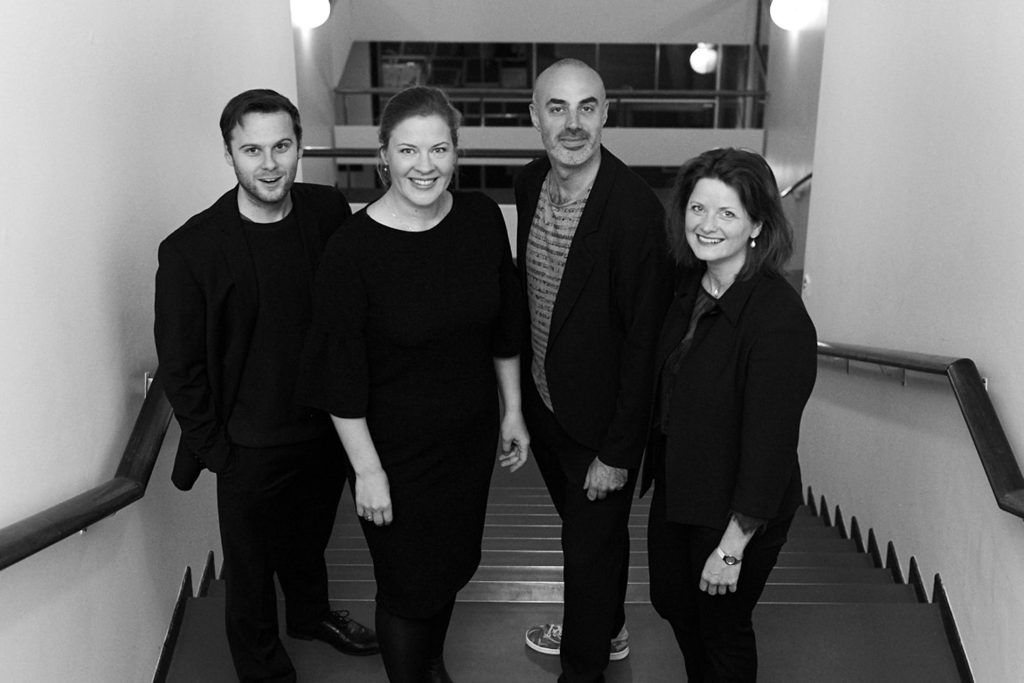Fine singing by Theatre of Voices sabotaged by imagery and insincerity

Theatre of Voices performed music of Arvo Pärt and David Lang Wednesday night at Zankel Hall.
The Theatre of Voices appeared Wednesday night at Zankel Hall in a concert that paired music from Arvo Pärt and David Lang, and promised lovely singing and fruitful commingling of mutual aesthetics.
What it turned out to be was a study in frustration, with the music being sabotaged in each case. On the first half, it was external factors that hindered Pärt, and on the second it was composer David Lang ho damaged his own cause.
Pärt’s music actually played a secondary role in the concert. Theatre of Voices, with Paul Hillier conducting and Christopher Bowers-Broadbent at the organ and piano, performed a generous handful of his shorter works: Für Alina, My Heart’s in the Highlands, Sarah Was Ninety Year’s Old, Cantate Domino canticum novum, I Am The True Vine, and Spiegel im Spiegel—the last in an arrangement for piano and two voices (soprano Else Torp and tenor Paul Bentley-Angell).
The music, however, served as a live soundtrack accompanying Songs from the Soil, a silent film (“visual poem” according to the program) of scenes from a biodynamic farm in Denmark.
Aside from the surface prettiness of the images, the film and music were in no way complementary. Songs from the Soil was obvious, rather than subtle, simplistic, rather than simple, flat instead of luminous.
That alone put a damper on the entire experience. But seeing how poorly the film integrated with the music did have the effect of highlighting Pärt’s unique quality in modern music. His pieces stand still in time and don’t develop on the linear classical model—his repetitions build a marvelous object rather than tell a story. Film is inherently sequential, and that narrative of one image after another, moving in one direction (in this case the changing seasons), forced a timeline onto Pärt that distracted the listener from its more abstract fundamental pleasures.
After intermission, the combined forces of Theatre of Voices and the Yale Voxtet sang David Lang’s choral piece, the writings—the composer abandoned capitalization years ago—in a world premiere of the complete work.
In six sections, the writings renders sensations of love, loneliness, fear, and other intense states via a text Lang adapted from Ecclesiastes. It is very much a part of the course the composer has been following for much of this century, with a focus on vocal and dramatic works, and a palette concentrated on the firm satisfactions of consonance.
In that regard, the writings was gorgeous. Though one misses the rhythmic energy and tension from Lang’s seminal works like cheating, lying, stealing and child, his use of harmony is masterful. The piece had a rough symmetry, with the framing section “again,” and the descending series of chords that formed the music were beautiful and strong. Interior sections used a combination of a slow cantus firmus moving through faster harmonies to powerful effect.
But there’s effect, and there’s affect. One consistent feature of Lang’s vocal music, especially in the current decade, has been a determination to emphasize the text with musical technique while maintaining a stone-faced expression. This was a troubling feature of a lot of indie pop and rock at the dawn of the century, and it has unfortunately inhabited Lang’s writing.
The combination of music and text in the writings presented itself as building to points of high emotional drama. Lang’s method was to have a singer repeat a short phrase, “my only hope is you,” for example, for near the entire duration of a sector. With his harmonies underneath, he was trying to heighten the experience through contrasts and repetition, and hammer home an intensity of anguish. And by bringing the opening material back at the end, the writings was a journey.
But it was a journey without memories or transformations. The music presented itself as smooth and sleek as an expensive interior design. There was gesture, but no affect, and it came off as ersatz—the ostensibly emotional solo lines had the same quality as the rest of the music, which was neutral in the extreme.
What was supposed to be fraught and moving came off as a play at obsession and mania. Lang didn’t commit himself to showing what he himself thought of the words, or the emotional experience, leaving it the listener’s responsibility to hunt for the proper response. This amounted to an insincere cop-out, an artist who wants to dazzle without showing if the music truly means anything at all to him.
The American Composers Orchestra plays music of Morton Feldman, Gloria Coates, and Du Yun, 7:30 p.m., April 11, in Zankel Hall. carnegiehall.org